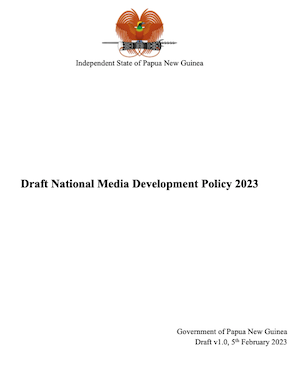An anti-corruption NGO in Papua New Guinea has criticised the haste with which the government is conducting consultation on a draft National Media Development Policy that could undermine media freedom.
The Community Coalition Against Corruption (CCAC) has called on the Department of Information and Communication Technologies to extend the time and breadth of consultation on this proposed national policy.
“Extended and broader consultation is required for this as media freedoms are vital to our democracy,” the coalition said in a statement.
Minister for Information and Communication Technology Timothy Masiu responded quickly and extended the deadline by one week from February 20.
In his capacity as co-chair of the coalition, Transparency International PNG chair Peter Aitsi said: “The two weeks given for consultation is not sufficient to consider the national and societal impact of this media policy and whether it is actually required.
“For instance, while the abuse of social media platforms is a new issue that is given as justification for the media policy, there are already existing laws that address the issue without undermining media freedom.
“This month, when we commemorate the legacy of the Grand Chief Sir Michael Thomas Somare, we recall his personal stance when Prime Minister opposing the regulation of PNG’s media when a similar bill was proposed in 2003.”
Editorial independence ‘cornerstone’
Another senior media spokesperson also said the government had failed to provide adequate time and conduct meaningful consultation over the draft National Media Development Policy 2023.

Media Council PNG president Neville Choi said in his capacity as co-chair of the coalition: “The editorial independence of newsrooms is a cornerstone of a functional democracy.
“Undermining media freedom, diminishes the role of the media as the mouthpiece of the people, holding those in power to account.
“Failure by the government to provide adequate time and conduct meaningful consultation, will ultimately undermine confidence in the government and the country, both domestically and abroad.
“If the concern is poor journalism, then the solution is more investment in schools of journalism at tertiary institutions, this will also increase diversity and pluralism in the quality of journalism.
“We need newsrooms with access to trainings on media ethics and legal protection from harassment.”
The media policy was initially released by the Department of ICT on February 5 and the public was only given 12 days to comment on the document, with the original deadline for feedback being February 17.
The policy includes provisions for the regulation of media and establishment of a Government Information Risk Management (GIRM) Division within the Department of ICT to implement measures to prevent the unauthorised access to “sensitive information”.
The coalition is a network of organisations that come together to discuss and make recommendations on national governance issues. It is currently co-chaired by Transparency International PNG and the Media Council.
Republished with permission.
Article by AsiaPacificReport.nz







